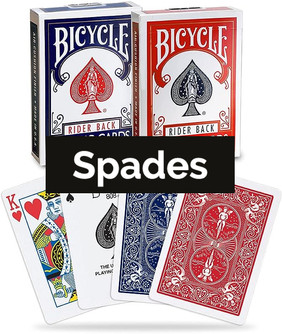This post contains affiliate links. For more information, see our disclosures here.
Official Spades Rules
Spades is a classic trick-taking card game enjoyed by players worldwide. It combines strategy, bidding, and teamwork (or cutthroat competition!) to create a thrilling gaming experience. Here's a breakdown of the rules to get you started on your Spades journey:
Objective
Work together with your partner to win the most tricks (card captures) during a round and fulfill your team's bid by winning a specific number of tricks.
Setup
Number of Players: 2 teams of 2 players (4 players total)
1. Deal the Cards: The dealer (chosen randomly or rotating turns) shuffles the deck and deals 13 cards face down to each player.
2. Forming Partnerships: Players sit opposite each other, and partners typically sit across from each other.
Gameplay
Bidding:
The bidding phase is crucial in Spades, as it sets the goal for each team and adds a layer of strategy:
Bidding Order: Starting with the player to the left of the dealer, each player bids on the number of tricks they believe their team can win during the round. Bids can range from "Nil" (winning no tricks) to "13" (winning all tricks).
Blind Bidding (Optional): Some variations include a "blind bidding" round where players make their bids without looking at their cards. This adds an extra element of risk and deduction.
No Passing: Players cannot skip bidding. If a player is confident they can't win any tricks, they can still bid "Nil."
Once the bidding is complete, the fun part begins - playing the tricks! Here's how it unfolds:
Leading the First Trick: The player to the left of the dealer leads the first trick by playing any card they choose (except a spade) face up to the center of the table.
Following Suit: Each player, in turn, clockwise around the table, must play a card that follows the suit led (e.g., if hearts are led, all players must play a heart if they have one).
Playing a Trump (Spade): If a player cannot follow suit, they can play any card from their hand, including a spade. Spades are the trump suit in this game, meaning they outrank all other suits. The highest-ranked spade played on a trick wins that trick, regardless of the leading suit.
Winning the Trick: The player who played the highest-ranked card of the suit led, or the highest-ranked spade if spades were played, wins the trick and collects all the played cards.
Leading the Next Trick: The winner of the trick leads the next trick by playing any card from their hand.
Nil Bid:
A team with a Nil bid has a special challenge. They must avoid winning any tricks throughout the round. If they succeed in winning zero tricks, they score a bonus of 50 points (or 100 points in some variations). However, if they win even one trick, their team is penalized all bids made by both players, and the opposing team automatically wins the round.
Scoring and Winning:
Tricks and Points: Each trick won is worth one point. At the end of the round, each team calculates the total number of tricks they won and compare it to their bid.
Fulfilling the Bid: If a team wins exactly the number of tricks they bid on, they score their bid value in points (e.g., bidding and winning 7 tricks scores 7 points).
Underbidding: If a team wins more tricks than they bid on, they score only the number of tricks they bid on (e.g., bidding on 5 tricks but winning 8 tricks only scores 5 points).
Overbidding: If a team wins fewer tricks than they bid on, they score nothing for that round.
Winning the Game
The game typically continues for a predetermined number of rounds (e.g., 10 rounds). The team with the highest cumulative score at the end of all rounds wins the game!
Notes/Variations
Breaking Spades: Spades cannot be led until they have been "broken," which means a player has played a spade when they couldn’t follow suit.
Blind Nil: A player can bid Blind Nil before looking at their cards, earning a bonus of 200 points if successful or losing 200 points if they win any tricks.
Reneging: If a player fails to follow suit when they are able to, it is called reneging, and the team loses the round with a penalty (usually the opposing team is awarded the number of tricks the reneging player bid).
Spades is a versatile game that offers a balance of strategy, communication (with your partner), and a bit of luck. With its easy-to-learn rules and exciting gameplay, Spades is a perfect choice for game nights, family gatherings, or whenever you're looking for a fun and engaging card game experience.










